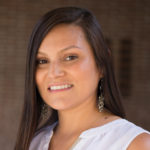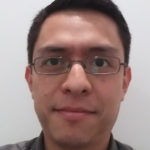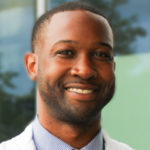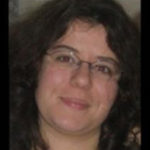We’re pleased to announce the recipients of the 2018 Provost’s Postdoctoral Scholar Research Grant program. This signature postdoctoral scholar initiative awards up to $25,000 in funding support, providing seed funding for independent research projects that can serve as a stepping-stone to external funding such as the NIH K99/R00 and F32 grant programs.
This year we reviewed close to 30 excellent proposals and selected six outstanding awardees.

Alejandra Gonzalez Calle (Ophthalmology) mentored by Jack Whalen: Effect of Stimulation parameters on percept color and percept shape in Argus II retinal prosthesis patients
Alejandra Gonzalez-Calle, PhD. received her B.S. from La Escuela de Ingenieria de Antioquia (Medellin – Colombia) in 2010. After two years working as a research intern in the ophthalmology field, she joined the University of Southern California for graduate school, earning degrees in biomedical engineering (M.S. 2012, Ph.D. 2017). During the master’s program she received a full tuition Master’s BMES researcher award. The award is one of the highest awards Viterbi School offered to incoming master’s students in biomedical engineering. Currently, Dr. Gonzalez-Calle is a postdoctoral research associate at USC Dr. Allen and Charlotte Ginsburg Institute for Biomedical Therapeutics with an overall interest in the conservation and preservation of vision.

Ismael Fernández-Hernández (Stem Cell) mentored by Michael Bonaguidi: A new in vivo high-throughput model of auditory neuron regeneration
Ismael Fernández-Hernández got a bachelor’s degree in chemical engineering from ITESO university in Mexico. After spending a couple of years as a process engineer in the food and pharma industry, he decided to focus on cellular-scale, biological processes with the purpose of bring them back to control when they derail in disease. For this, he undertook postgraduate studies in the biosciences: he earned a M.Sc. from the Autonomous University of Madrid, Spain, his PhD from the University of Bern, Switzerland, and did a short postdoctoral stay at the Institute for Research in Biomedicine in Barcelona, Spain. Dr. Fernández-Hernández arrived at USC in 2015 via one of the Provost’s signature postdoctoral scholar initiatives, the USC-CONACYT Postdoctoral Scholars Program. Today, he continues to work with Dr. Michael Bonaguidi as a postdoctoral scholar at the Eli and Edythe Broad Center for Regenerative Medicine and Stem Cell Research at USC.

Lee Gibbs (Translational Genomics) mentored by John Carpten: Identification of novel tumor-specific isoforms and isoform-specific mutations using nanopore long-read sequencing technology
Dr. Lee Gibbs works with a multi-disciplinary team under the guidance of Dr. John D. Carpten in the Department of Translational Genomics at Keck School of Medicine of USC.
Their team evaluates genomic alterations that are inherited and acquired during tumor development to understand the clinical significance of these events. Their project uses Oxford Nanopore Technologies’ (ONT) MinION, a portable device that is based on single molecule sequencing technology that provides reads of unprecedented length by performing voltage driven molecule translocations through small nanosensors. Utilizing ONT’s long read sequencing technology to sequence DNA and RNA can lead to recognition of novel biomarkers to enhance detection, treatment, and prognosis. Further, this will allow them to unveil novel isoforms and begin to understand the true identity and complexities of oncogenes and tumor suppressors.
Dr. Gibbs’ proposed study will determine the true representation of a disease-specific transcriptome and identify novel tumor-specific isoforms and isoform specific mutations in cancers, particularly those affecting diverse populations within the Norris Cancer Center catchment area. His long-term goal is to evaluate the functional significance of these novel isoforms and isoform specific mutations and their potential as prognosticators, diagnostic biomarkers, and therapeutic targets. Dr. Gibbs’ research aims to contribute to the identification of novel diagnostic biomarkers and the evolution of precision medicine.
 Diane Goldenberg (Psychology) mentored by Darby Saxbe: Sleep and the Fathering Brain: Characterizing the Impact of Sleep Disruption on the Neural Underpinnings of Self-Regulation in New Fathers
Diane Goldenberg (Psychology) mentored by Darby Saxbe: Sleep and the Fathering Brain: Characterizing the Impact of Sleep Disruption on the Neural Underpinnings of Self-Regulation in New Fathers
Dr. Goldenberg is a postdoctoral researcher in the Department of Psychology at USC Dornsife College of Letters, Arts, and Sciences. Dr. Goldenberg received her doctorate in Psychology at the University of California, Los Angeles, where she examined the role of pubertal hormones in shaping the developing brain during adolescence. At USC, Dr. Goldenberg works under the guidance of Dr. Darby Saxbe to characterize the neural and hormonal changes that occur during the transition to fatherhood.
For her project, Dr. Goldenberg will investigate how changes in sleep during the transition to parenthood impact neural functioning and parenting behavior in a sample of first-time fathers. The United States is the only developed country without national paid family leave provisions for new parents, guaranteeing only unpaid leave, potentially limiting its use by fathers. However, fathers who work full time cannot catch up on night-time sleep deficits during the day. Research suggests that lack of sleep is associated with specific neural and behavioral impairment, particularly when exerting regulatory control during affectively salient contexts. This has important consequences outside the confines of the laboratory, especially for new, sleep-deprived parents tending to a crying infant. Characterizing the neural and behavioral correlates of poor sleep quality in new fathers has the potential to inform interventions and policy improvements related to paternal leave. This is a population that is particularly vulnerable to the effects of sleep disruption, with potentially profound consequences for the infants they are losing sleep to raise. Her broad research interests focus on characterizing the dynamic neurobiological interactions that can drive change during important transition periods.

Helen Lee (Occupational Science and Occupational Therapy) mentored by Grace Baranek: Early Behavioral Characteristics and Biobehavioral Signs of Autism Spectrum Disorder (ASD): A Novel Parent-Infant Interaction Paradigm
Dr. Lee received her doctoral degree from the University of Chicago, with focus in cultural psychology and developmental psychology. She is currently a postdoctoral research associate in the Mrs. T.H. Chan Division of Occupational Science and Occupational Therapy at the University of Southern California. Her main research interests include early identification and intervention work related to autism spectrum disorder (ASD) in the contexts of culture and physiological biomarkers. Dr. Lee’s pilot study will examine biobehavioral synchrony during mother-child interactions associated with infants’ at-risk status for later diagnosis of ASD. This project will study the patterns of biobehavioral synchrony in the interaction of parent-infant dyads with varying levels of risk for ASD. The findings will provide insights into the relationship between the patterns of the synchrony and early behavioral risk markers of ASD characteristics.

Stephanie Lefebvre (Occupational Science and Occupational Therapy) mentored by Sook Lei Lieu and Danny JJ Wang: Modulating the motor system with tDCS to enhance post-stroke motor recovery
Stephanie Lefebvre is a Postdoctoral Researcher at USC’s Neural Plasticity and Neurorehabilitation Laboratory. Prior to this position, she completed a B.S. in Genetics and Biology from the UCBL (France), a MSc, in Biomedical Sciences from the UNIL (Switzerland), and a Ph.D. in Biomedical Sciences from the UCL (Belgium). She also completed a first Postdoctoral Fellowship at the University of Lille (France) and a second one at the CNRS, Lyon (France). Her main research interest is to promote the use of noninvasive brain stimulation to modulate neural plasticity to restore brain function after neurological disease.